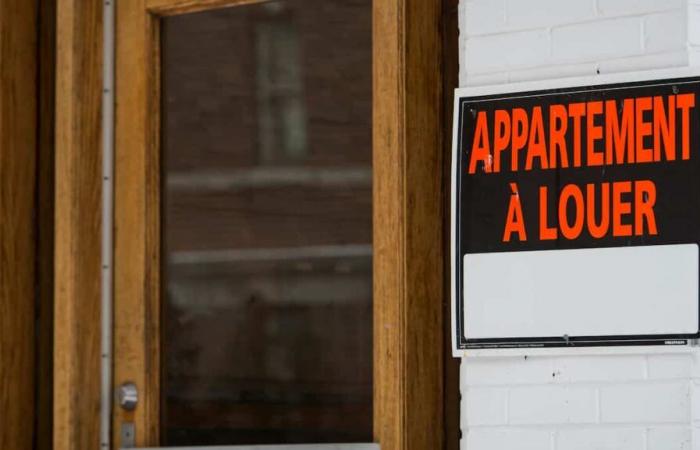After record rates in 2023 and 2024, the average percentage of rent increase suggested by the administrative housing court (TAL) for 2025 reached a summit in 30 years in Quebec. Here’s what you need to know.
• Read also: Not the fault of immigrants: the real causes (and solutions) of the housing crisis which will continue in 2025
• Read also: Tenants and owners are less and less: rent bindings explode at Tal
Each year, the TAL offers a calculation tool, which allows owners to establish the revision of the rents to be assigned to the tenant according to criteria related to the expenses of the building, such as maintenance costs, municipal and school taxes, Insurance premiums and major work carried out, among others.
Here are the average basic increase estimates (which does not take into account the increase in municipal taxes) such as published by the TAL:
- Unheated accommodation: 5,9%
- Housing heated to electricity: 5,5%
By calculating the increase in municipal taxes, the average percentage of increase for unheated housing is 6,5% and 6,1% For heated to electricity accommodation.
If we add expenses to major work in addition to municipal taxes, we are talking about 8,5% et 8,1% respectively.
How much for accommodation at $ 1000 per month
For a monthly rent of $ 1,000, before the addition of municipal taxes and costs for major work, the owner could request a basic increase in 59$for unheated accommodation and 55$ For heated to electricity accommodation.
Taking into account the tax increases and expenses for major work, the respective increases amount to 85$ et 81$ per month.
In 2024, the TAL suggested an average basic increase in 4% For unheated accommodation and for heated to electricity accommodation. The rate of 2025 represents an increase in 47,5% for unheated accommodation and 37,5% For heated electricity accommodation compared to last year.
Please note: it can be difficult for a tenant to fill out the form in order to have a better idea of the potential increase in rent to be expected since many information that he does not necessarily know is required for the calculation.
Can your landlord increase your rent as they see fit?
In Quebec, an owner is free to offer the increase in rent of his choice. Contrary to what you can believe, there is no maximum rate.
But the tenant is also entitled to refuse this increase in rent if he deems it abusive and inexplicable.
• Read also: The housing crisis struck hard in 2024: “the situation deteriorated”
After sending a written response – which must ideally be sent by registered mail -, the tenant can be amazed with his owner. If no agreement is concluded, the locator can then turn to the TAL to make a rent for fixing rent.
But beware: if the building is under the age of five, the owner can impose the increase he wants if the F -clause box is checked on the lease.
How to contest an increase in rent?
A tenant who judges the increase in rent proposed by the owner as being abusive and inexplicable must absolutely signify his refusal in writing no later than a month after receipt of the opinion.
The ideal is to send a letter by registered mail to obtain proof of reception. Please note: if you omit to respond to the opinion, you are deemed to have accepted the increase in rent.
• Read also: Here is the necessary funding to buy property in different cities in Quebec in 2024
-Following the refusal, the owner and the tenant can be amicably. If the parties do not reach an agreement, the owner will have to contact the TAL in the month following the refusal. The court will therefore fix the price of the rent itself.
The tenant retains his lease during the negotiations and the latter is renewed without modification until the Tal’s decision.
When can an owner increase the rent?
The rent can only be revised when renewing the lease, never in the middle of it.
To do this, the owner must send a lease renewal notice to his tenant within a prescribed period:
For a 12 -month lease, the opinion must be sent between 3 and 6 months before the end of the lease. The opinion must therefore be sent no later than March 31, 2025 for a lease which ends on June 30, 2025.
For a lease lasting less than 12 months, the opinion must be sent 1 to 2 months before the end. If the lease ends on June 30, 2025, the opinion must therefore be sent between April 30 and May 31, 2025.
• Read also: Tenants feel obliged to accept “abusive” rent increases
Finally, for an indefinite lease, the notice must be sent from one to two months before the date of entry into force of the proposed modification.
The notice notice that your owner sends you to contain specific information, including the amount of the new rent offered, the proposed duration of the lease if it is modified, the deadline granted to refuse the increase and any other requested modification.
If the opinion has only two choices, either accept the increase in rent or leave the accommodation, it does not comply with the law.
“The worst is to be feared for tenants”
The grouping of housing committees and associations of tenants of Quebec (RCLALQ) said it was “dismayed” by the rates published by the TAL and affirms that they “contribute to maintaining the explosion of rents which strikes Quebec”.
“The worst is to be feared for the tenants,” said the RCLALQ in a statement.
The group denounces that the TAL takes into account the net income of a building in the rent fixing criteria.
“For the RCLALQ, this premium for the benefit is illegitimate and only worsens the inequitable dynamics between tenants and owners,” adds the group, which describes the situation as “vicious circle”.
For its part, the Minister of Housing France-Élaine Duranceau supported in press scrum on Tuesday afternoon, that “the real solution is to increase the housing supply”. According to her, the government cannot decide for the TAL to cap the price of rents.
“Necessary” increases
The corporation of real estate owners of Quebec (Corpiq) says that the high increases “are necessary and reflect the delay accumulated by an inadequate calculation method to follow the evolution of real costs”.
The organization still pleads for a reform of the criteria used for the fixing of rents to achieve a “more balanced, fair and understood method of everyone”, she underlines.






